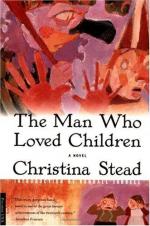|
This section contains 2,280 words (approx. 8 pages at 300 words per page) |

|
At the heart of Christina Stead's fiction echoes the persistent moral issue: egotism. She sees everyone striving by subtle or overt manipulations to subordinate others to his or her own needs and desires, trying to take as much while giving as little as possible. In her 1940 masterpiece, The Man Who Loved Children, Stead criticizes this ongoing struggle between competing egotisms, not only in her characterization and analysis, but in the very form of her fiction. This novel takes as protagonist no single hero, but an entire family. The animating conflicts from which Stead has constructed her story are the manifold tensions of family life. She shows each of her characters from his or her own point of view, but also as seen by the others. Creating all of her characters as they affect and are affected by each other, Stead achieves a multiple layering of distinct and fully...
|
This section contains 2,280 words (approx. 8 pages at 300 words per page) |

|


